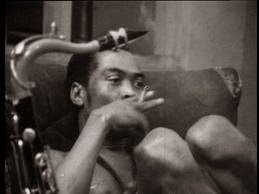Mark Anthony Neal's Blog, page 831
March 22, 2014
Microaggressions: Comments That Sting [Video]
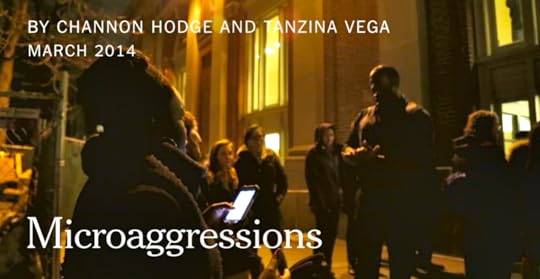 NewYorkTimesVideo
NewYorkTimesVideo
Across college campuses and social media, younger generations have started to challenge those fleeting comments that seem innocent but leave uneasy feelings behind.
Published on March 22, 2014 14:36
Mark Anthony Neal @ SCMS 2014: Teaching Race & Media in Post-racial/Post-Trayvon America
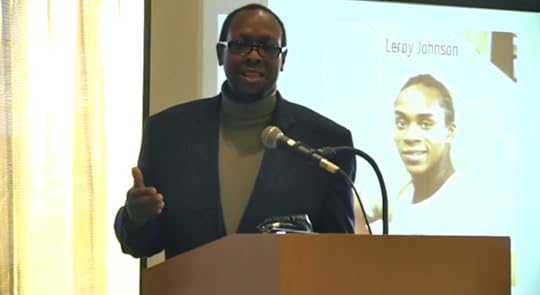 SCMStudies
SCMStudies
Cultural Critic and Professor of Black Popular Culture at Duke University, Mark Anthony Neal speaks about framing the death of Trayvon Martin and any other number of black men and women in the context of the ways that we think about black masculinity and media culture.
Published on March 22, 2014 14:04
March 21, 2014
It Takes a Village to Keep Black Men Healthy by Mark Anthony Neal
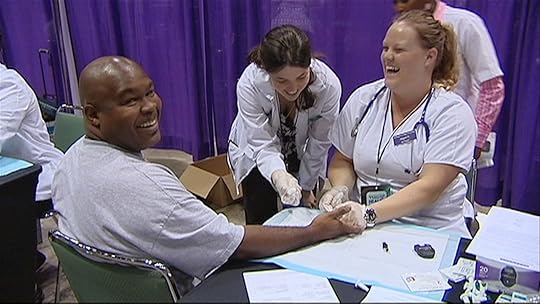 African-American men—and those who love them—have to work together to combat preventable diseases like high blood pressure.
African-American men—and those who love them—have to work together to combat preventable diseases like high blood pressure.It Takes a Village to Keep Black Men Healthy by Mark Anthony Neal | The Root.com
I had my annual physical examination a few days ago, and upon checking my vitals—my blood pressure score, as I’m telling everybody, was 118/72—my doctor, a 60-something white woman, jokingly remarked, “Love it when my peeps are doing well.”
And though in many other settings her attempt at colloquial bonding might have been met with a raised eyebrow, that wasn’t my response in this case. Her invocation of the familiar expression “peeps” was really an acknowledgment that she and I have built a level of trust between patient and doctor: She’s been my primary care physician for more than five years.
But sadly, too many black men, even those with adequate health care coverage, fail to develop such relationships with their doctors. For far too many black men—with or without health insurance—their primary care physician is an emergency room attendant.
The health status of black men in this country is well-known. As the Centers for Disease Control and Prevention reports, the percentage of black folk in poor health outnumbers that of their white peers, a reality that’s reflected in numbers like black male obesity rates and the percentage of black men with hypertension, or high blood pressure, in comparison with white males. (Black women’s rates for both conditions are much higher.) These stats reflect an increased incidence of chronic and preventable conditions that could be addressed through regular physical activity and better eating habits.
Yet as researchers, led by Vanderbilt University’s Derek Griffith, have shown in a series of studies published over the past three years, there are numerous obstacles to black men being able to engage the kinds of behaviors necessary to address what, over time, become debilitating diseases. Ironically, one of these is stress associated with trying to maintain their roles as “responsible” black men.
Read Full Essay @ The Root.com
Published on March 21, 2014 16:21
"Left of Black' Preview: Defending the Importance of Hip-Hop Scholarship
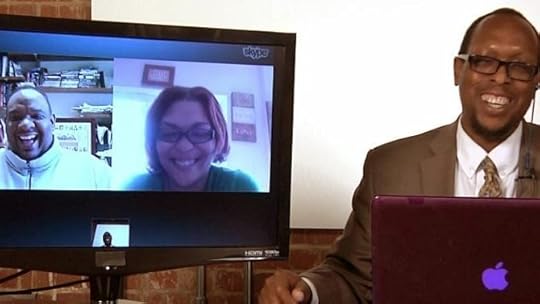
The Root.com
Left of Black host Mark Anthony Neal is joined by Julius Bailey, assistant professor of philosophy at Wittenberg University, and Regina Bradley, an instructor of English and interdisciplinary studies at Kennesaw State University. They are discussing the importance of hip-hop studies and the use of social media in hip-hop scholarship.Recently Bradley contributed to and Bailey edited the volume The Cultural Impact of Kanye West.
Published on March 21, 2014 16:04
Report: Widespread Racial Disparities In Public School Punishments
Published on March 21, 2014 14:51
Fela x Pharrell - "Happy Mentality" (by DJ 100 Proof)
Published on March 21, 2014 14:16
March 19, 2014
Feminism Is Fashionable For Nigerian Writer Chimamanda Ngozi Adichie
Published on March 19, 2014 12:59
Jasiri X Speaks on Media Literacy, Moral Mondays & the Role of Hip-Hop
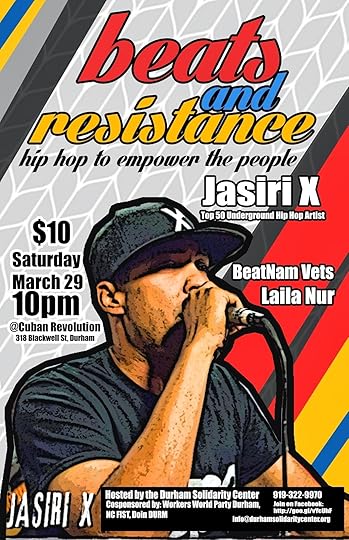 Jasiri X Speaks on Media Literacy, Moral Mondays & the Role of Hip-Hop
by Lamont Lilly | special to NewBlackMan (in Exile)
Jasiri X Speaks on Media Literacy, Moral Mondays & the Role of Hip-Hop
by Lamont Lilly | special to NewBlackMan (in Exile)Originally from Chicago, Jasiri X is a Pittsburg based emcee whose political and socially charged rhymes specialize in empowering the people through truth, knowledge and understanding. From Stop-and-Frisk to Trayvon Martin, from Renisha McBride to the Occupy Movement, Jasiri X leaves no stone of injustice unturned. He’s performing in Durham, NC for the upcoming Southern Socialism Conference Saturday, March 29th at Cuban Revolution. Read along as we briefly discuss the man and his message.
Lamont Lilly: Brother Jasiri, when did you first come to Hip Hop? And when did Hip Hop come to you through the art of emceeing?
Jasiri X: The Mid 90’s. A friend of mine got a set of turntables as a gift and asked me to write a rhyme, it was terrible, but I kept writing and eventually got better.
Lamont Lilly: Your style and content remind me a lot of the artists from Hip Hop’s “Golden Age.” Who were some of your biggest influences growing up?
Jasiri X: On the Hip-Hop side definitely Nas, Mobb Deep, Lauryn Hill, Wu-Tang and of course Public Enemy, Rakim, and KRS-One. Also working with Paradise of X-Clan has been extremely helpful.
Lamont Lilly: There seems to be a nice crop of revolutionary Hip Hoppers who are really doing their thing now. Dead Prez, Immortal Technique and Brother Ali are just a few. Are you working with any artists similar to yourself?
Jasiri X: I've been blessed to perform with all of these artists, and to collab with Brother Ali and M-1 of Dead Prez. I would also recommend Sa-Roc and Quadir Lateef, two artists I've recently worked with.
Lamont Lilly: The Black community has recently lost several key figures who dedicated their lives to fighting for justice. What did the deaths of Nelson Mandela, Amir Baraka and Choke Lumumba mean to you?
Jasiri X: These were all true revolutionaries and freedom fighters. Because of their tremendous contributions to our liberation, I would never say they are dead. Their spirit still lives. Their examples make me want to work harder for oppressed people all over the earth.
Lamont Lilly: In 2012, you performed in North Carolina for the Democratic National Convention held in Charlotte. You and Bronx based trio, Rebel Diaz headlined the March on Wall Street South Concert. How did that come about?
Jasiri X: The organizers contacted me and of course I wanted to be involved with raising awareness about how these criminal banks effect the very poor.
Lamont Lilly: As an emcee from the Midwest, what is it about the state of North Carolina that gravitates toward your work? Your message really seems to resonate here.
Jasiri X: That's a great question and I'm not sure what the answer is. I know North Carolina has a deep history of fighting for truth and justice, and that's the basis for the music that I make, so maybe that's why.
Lamont Lilly: Are you familiar with the Moral Monday Movement? It’s become a national phenomenon.
Jasiri X: Of course and I support it 100%. When people start trying to take away our basic rights, it's proof they are scared and we are winning.
Lamont Lilly: For the last few years now, you’ve been working with a Black male mentoring initiative called “One Hood Media Academy.” What is the goal of this organization? And what role do you serve?
Jasiri X: 1Hood Media Academy is a tool to help young people critically analyze messages, broaden their experience of media, and develop creative skills in creating their own media messages. Media literacy is a means of educating young people on the effects of media societal perception, and more specifically, on how it shapes the way young people view “reality.” We explore the constant bombardment of media images and how these images shape youth perception of self, parents, community, and the world. We educate young people on the fallacies involved in the utilization of certain images and how an incorrect, warped perception of themselves is formed, as well as, how to counteract the effects. I'm the founder, and I also am proof you can be conscious and successful in Hip-Hop.
Lamont Lilly: You’re obviously just as much an activist as you are an emcee. And you’re a father. How do you balance all of that and still remain sane?
Jasiri X: [Laughing] I'm trying to figure that out myself...
Lamont Lilly: Brother Jasiri, where does the last name ‘X’ come from? You’re not related to Brother Malcolm X are you?
Jasiri X: I'm a member of the Nation of Islam so I got my X in the same way Malcolm got his, but we're not physically related. Of course Malcolm and his autobiography has had great influence on my life and my activism.
Lamont Lilly: A few months ago, I caught one of your live interviews on the syndicated talk show, ‘Left of Black’. How did you link up with Duke University Black Studies professor, Mark Anthony Neal?
Jasiri X: I believe we met online, and later he had me on his show and invited me to Duke University for a conference. Dr. Neal is one of my biggest advocates, and has been instrumental in my success.
Lamont Lilly: One of North Carolina’s Hip Hop field generals, 9th Wonder is now teaching classes at both Duke and Harvard University as a Teaching Fellow. Could you ever see yourself as a dual threat of part conscious emcee, part radical professor?
Jasiri X: I've spoken at several universities and I'm currently working on a project with a university in the Pittsburgh area, so that could be a reality very soon.
Lamont Lilly: What advice would you offer to young Hip Hop artists just beginning to sculpt their craft? How do they “get on” and avoid being pimped by the industry?
Jasiri X: I tell young emcees to read as much as they can because the more words they know the better their rhymes will be. As far as the industry, it's falling apart. The best thing to do is build your own fan base, performing live and through the internet.
Lamont Lilly: Brother X, last question. I’m sure you’re aware of the role of music in reference to political and social movements. Artists like James Brown, Celia Cruz and Miriam Makeba were generational catalyst. Bob Marley and Nina Simone were at the frontline of advocating for justice. What type of legacy do you want to leave for the people?
Jasiri X: That I used my voice to speak truth to power, and wasn't afraid to stand up for my community and my people.
Much thanks for your time, Brother Jasiri. We’ll see you in Durham, North Carolina. Saturday, March 29that Cuban Revolution. Fight the Power, my Brother! Fight the Power.
■
The following interview was sponsored by the Durham Solidarity Center and Fighting Imperialism Stand Together (FIST). Lamont Lilly is a contributing editor with the Triangle Free Press, Human Rights Delegate with Witness for Peace and organizer with Workers World Party. He resides in Durham, NC. Follow him on Twitter @LamontLilly.
Published on March 19, 2014 12:28
Meshell Ndegeocello Covers Whodini's 'Friends'
Published on March 19, 2014 09:52
March 17, 2014
Musicology Colloquium Series at Princeton Presents: Mark Anthony Neal—“Trapped in the Soul Closet"
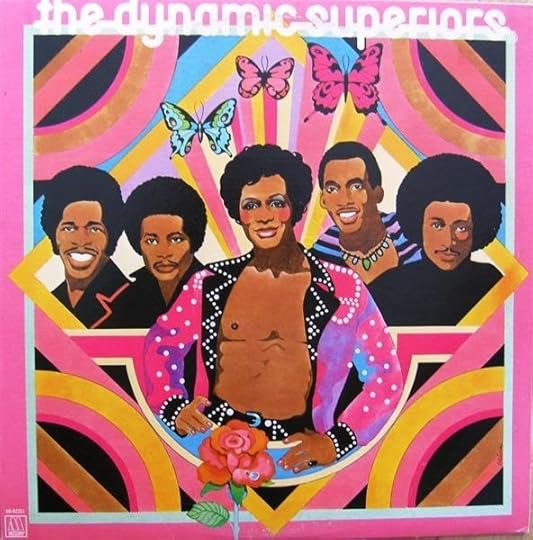
MARK ANTHONY NEAL:"TRAPPED IN THE SOUL CLOSET"
Mark Anthony Neal | Duke University
"Trapped in the Soul Closet"
Princeton University
Thursday March 27 at 4:30 pm
Woolworth Center, Room 106
Cosponsored by the Department of English and the Program in American Studies
Support provided by the Princeton University Lewis Center for the Arts
Thanks to the Program for Gender and Sexuality Studies for additional co-sponsorship
Published on March 17, 2014 16:39
Mark Anthony Neal's Blog
- Mark Anthony Neal's profile
- 30 followers
Mark Anthony Neal isn't a Goodreads Author
(yet),
but they
do have a blog,
so here are some recent posts imported from
their feed.



